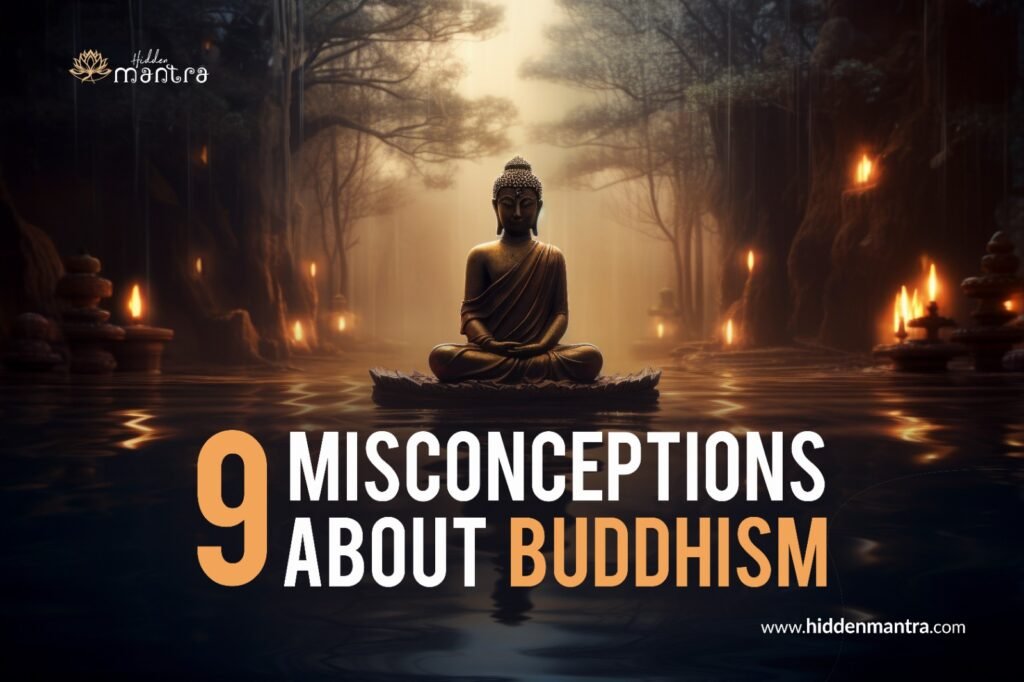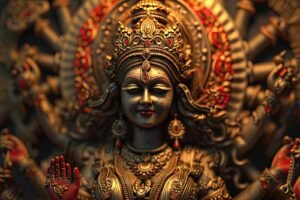Buddhism is a religion and also a philosophy which originated in India around 2, 500 years ago. There are a lot of misconceptions in existe in Buddhism. The reasons are many; it may be because of culturally specific reasons influenced by either Asian or Western culture. Modern Western thinking and traditional Chinese thinking also play a huge role in formulating misconceptions about Buddhism.
Another major reason that can cause misconceptions is the emotional factor of people or the difficulty level of materials. If the teacher is not qualified enough to give the right message, it can create misconceptions, and also, the one who took poor notes or their understanding capacity all cause the same issue.
In this blog, we are going to clear all the misconceptions about Buddhism so you can embrace the right knowledge and get on the path to enlightenment.
Myth #1: Buddhism is All About Suffering (Pessimistic)
The prime principle of Buddhism is the four Noble Truths, and it deals with truths of suffering. Every human being undergoes a state of suffering in their lifetime without a way to escape it. Most of the happiness we get in our life is from worldly pleasure. They all come with an expiry date because they never last. They can’t satisfy us, and we always want more; it is just a human tendency. Buddhism is not against happiness. Instead, it focuses more on the fullest level of joy that can last forever.
Myth #2: Buddhists Don’t Believe in Anything (Atheist)
Buddhism does not believe in the concept of God. It is a common myth about Buddhism that it does not believe in anything at all, which makes the concept of Buddhism an Atheism. In reality, Buddhism is a non-theistic philosophy. The ultimate goal of those who follow the idea of Buddhism is to attain enlightenment. So, in that scenario, the concept of God or deity is completely irrelevant. People believe that worshipping God or deity helps them to get out of the sufferings of life, and it is not right. we all know suffering is part of human life. The only way to reduce suffering is through self-awareness and ethical conduct.
Myth #3: Buddhism is About Reincarnation (Soul)
Many people believe that Buddhism revolves around the concept of a soul and connects it with the idea of reincarnation. In reality, Buddhist believe in rebirth instead of reincarnation. Buddhism put forward the concept of the cycle of rebirth. One’s action or Karma influences the future existence. Good actions lead to positive rebirths, while negative actions result in less favourable ones.
Myth #4: You Have to Become a Monk/Nun to be a True Buddhist
A common myth about Buddhism is the belief that one must become a monk or nun, dedicating their lives to strict practices, to be considered a true Buddhist. So, this misunderstanding can create a limited perspective about Buddhist practices that will make people believe that they can’t follow a monastic lifestyle. In reality, what matters is that Buddhism originally offered multiple paths to spiritual development and enlightenment. People from all spheres of life can adopt it.
Myth #5: Meditation is Just Sitting Still and Blanking Your Mind
Another myth in Buddhism is that people believe that meditation is all about emptying your mind of thoughts. Instead, it is about observing your thoughts without strong emotions. The goal is to lower your thoughts and try to quiet the Monkey mind. So meditation is a practice to quiet brain chatter and focus your inner mind. By paying attention to your body, your breath, your thoughts and your surroundings, you can get focused and relax your body.
Myth #6: Buddhism is All About Chanting and Statues (Superficial Rituals)
One of the common misconceptions about Buddhism is the belief that every religion primarily revolves around chanting, rituals, and the worship of statues. This misunderstanding can lead to the misconception that Buddhism is mainly concerned with outward practices and ceremonies. In truth, rituals and ceremonies are supportive tools rather than the major essence of Buddhism. Buddhism is focusing on the deeper philosophical and ethical foundations of the faith. Chanting and rituals are the stepping stones to reaching mindfulness, concentration and inner peace, which is attained through meditation.
Myth #7: Karma is Destiny (Fatalistic)
We all know that Karma is an integral part of Buddhism. So, people tend to misunderstand that the ultimate destiny of Buddhism is Karma. In Buddhism, Karma is the result of our actions. We all create Karma for ourselves, and it affects us equally. In this sense, we can understand that Karma is all about action, and it is not the ultimate destiny. When we do good things, the results will be positive; when we do bad things, we must pay for that. The future is not something stagnant. Instead, it is indefinite.
Myth #8: Buddhism is Incompatible with Science (Anti-Science)
People tend to believe that Buddhism is against science. This misconception arises that religious or spiritual beliefs are based on faith and superstition while science is based on evidence, reason, and observation. So some may have misconceptions about Buddhism because Buddhism’s teachings include concepts like Karma, rebirth and meditation. There are a lot of superficial differences between Buddhism and science in terms of language, methods and focus. At the same time, they share common ground in understanding reality and also improving the human condition for the better. In a nutshell, we can say that Buddhism and science offer different perspectives and methods for exploring the nature of existence and the mysteries of the universe.
Myth #9: Buddhism Requires Giving Up Everything You Enjoy (Restrictive)
The final misconception about Buddhism is that it requires giving up everything you enjoy. The core of Buddhism is that desires create suffering. People suffer because they don’t get what they want. That doesn’t mean you have to give up everything and start a life in a hut somewhere in the forest. So, the solution is to have the right focus. It is a journey and not a destination; whatever you want to accomplish in your life, consider that as a process so you can be calm when you face failures.
Conclusion
In conclusion, we can say that, above all, misconceptions about Buddhism are just myths. I hope through this blog, you got the actual reality of Buddhism. By getting a clear idea through our blog, you can start fresh and reach the path to enlightenment. Always keep an open-minded attitude towards Buddhism, which helps you to cultivate empathy, wisdom and compassion. For more such blogs and to attain a path to understanding and peace of mind, visit our page, Hidden Mantra. Here, you have all the answers to your doubts.










